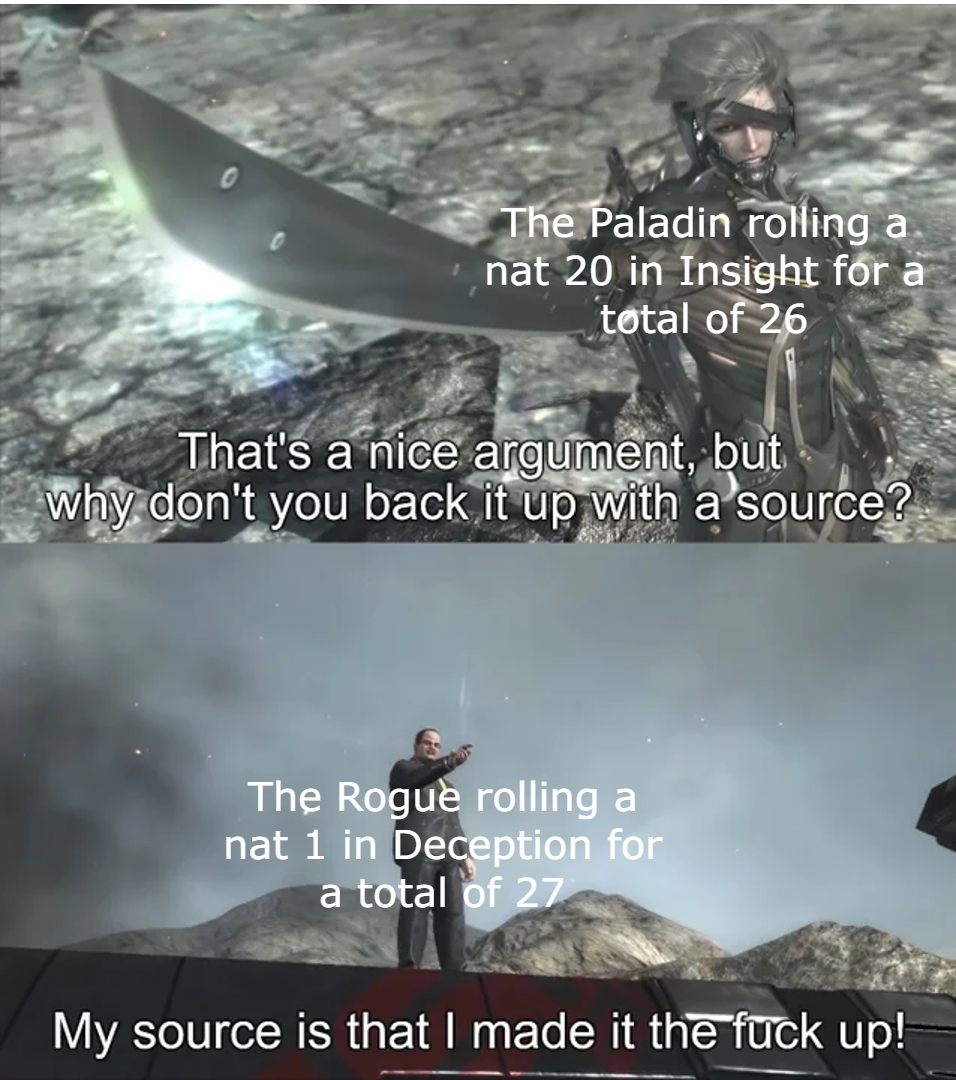RPGMemes
Humor, jokes, memes about TTRPGs
I like how Pathfinder 2E does it. A 20 brings your result one tier higher. A 1 brings your result one tier lower. With a high enough base expertise, you can still succeed when rolling a 1, just not as awesome as you normally are. And a 20 isn't a guarantee against really strong foes.
This. Plus, if you beat the DC by 10 or more, you get a Critical Success or if you fail by 10 or more you get a Critical Failure, regardless of the dice roll.
And for opposed skill checks only the player/NPC taking the action rolls a d20, and that's compared against the opposing skill DC (10 + Skill Bonus). This streamlines play and reduces random variability.
So in the example here, only the rogue would have rolled the natural 1 and added 26 for a 27. The paladin's Perception DC would be 16, so the Rogue beat it by 11 and it'd normally be a Critical Success. But since it was a natural 1, the Critical Success is reduced to a Success. They still succeeded at deception, but not quite as well as they could have.
I've had players have this exchange, and then the Paladin decided to ignore the rogue's critical miss, and just roll with it.
Paladin to the rest of the party "I forget what they said exactly, but it was a very convincing argument!"
I like critical failure.
Skilled people can sometimes choke under pressure.
I've been trying to include failure techniques from DungeonWorld's suddenly ogres in my game. It proposes a few neat ideas for consequences of failure that are broadly applicable to many RPG systems.
Eg, in the example above, maybe the Rogue (truthfully or not) blabs that their source was [ancient evil tome forbidden by the paladin's order]. Now the complication is not that the Paladin disbelieves the rogue's claim, but that they might question the rogue's true intentions.
Edit: Or in the example given about landing a plane. An experienced pilot won't crash 1/20 times, but what if Air Traffic Control did a bad job managing things today? It will take 1h for the plane to be assigned to a gate, but you need to catch the train to Borovia in 1h15.
An award winning surgeon rolls a 1 while giving a routine lecture? The presentation is so fucking boring that half the students fall asleep. Now the surgeon has to deal with the extra office hours of students who don't understand this part of the curriculum.
Yeah, I really like the "success with complications" category (Fate system does something like this, too) to keep things moving when a bad roll would otherwise make 1-in-a-million tragedy happen.
Doubly so if that bad roll would be a session- or campaign-ender.
Surely 1 when landing a plane indicates a go around
I like the idea of a critical role needing another roll to see just how critical it was. That way something crazy can always happen, but it doesn’t need to be a certain doom either.
